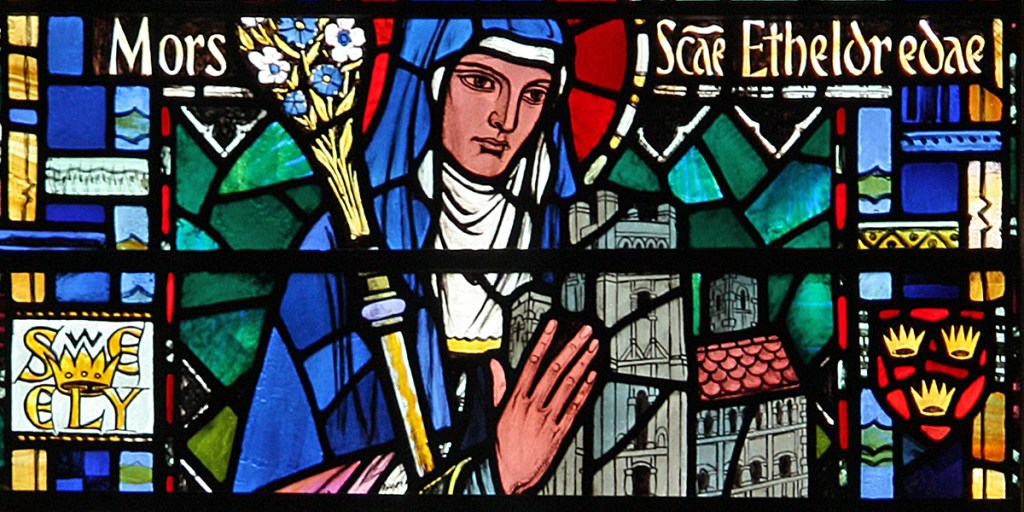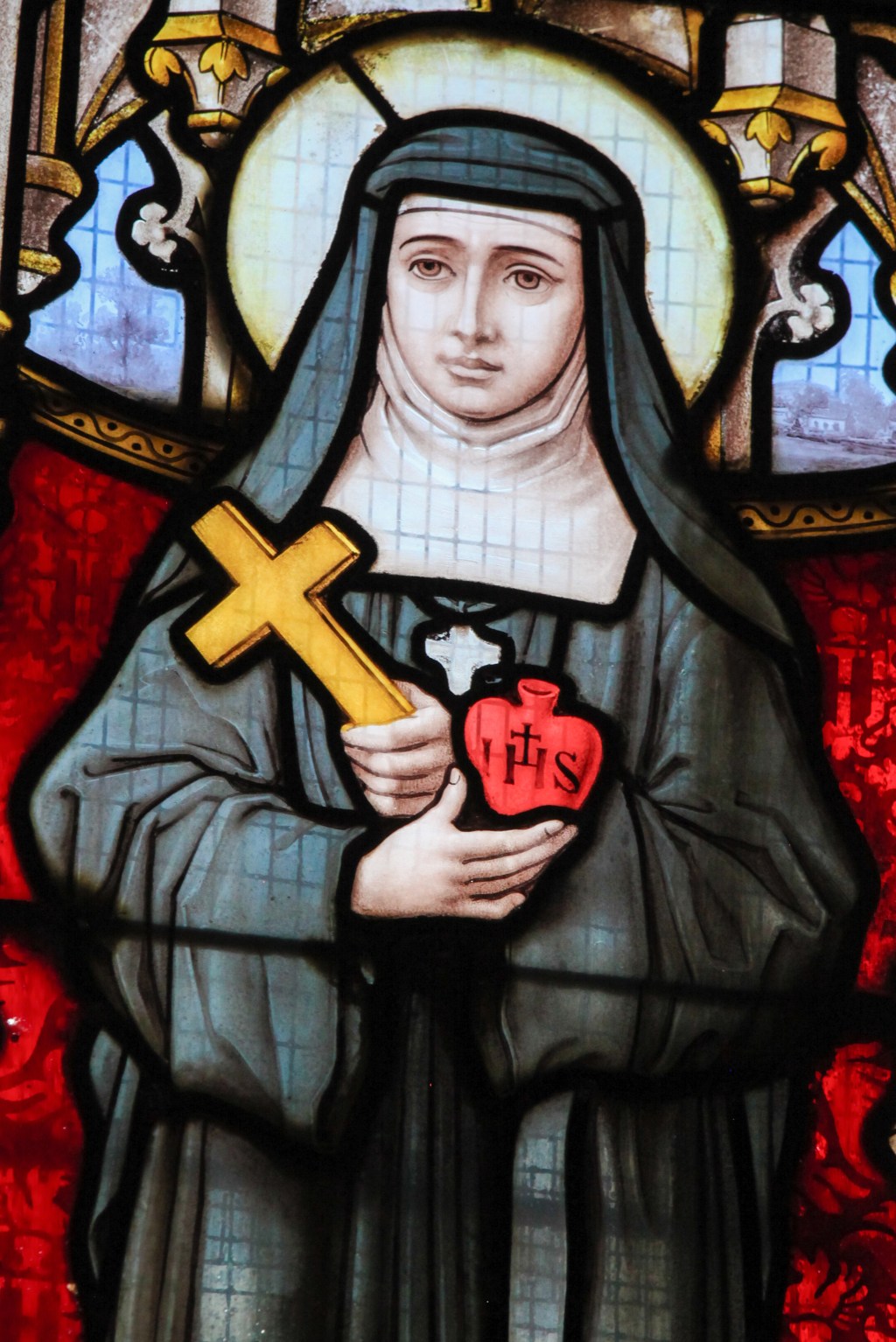St. Aethelthryth (or Etheldreda) is celebrated on June 23. Her sister, also a saint, is named Seaxburh. Today, names like these can seem awkward looking and are often challenging to pronounce.
That many of their names have various spellings in use today only adds to the confusion.
(On the bright side, if you’re someone who bends the game rules in Scrabble and allows the use of proper names, then all of these variant spellings could be a tremendous plus!)

Despite their awkwardness, these rather long but wonderful names conceal some equally wonderful stories: mothers who were succeeded by their daughters as abbesses (yes, it’s possible), geese that are resurrected (see the legend of St. Achahildis), or a successful escape after being captured by pirates (St. Theoctista)…
Here are twelve extraordinary saints from the Middle Ages who edify us with their love and trust in God:
St. Achahildis of Wendelstein
Achahildis of Wendelstein was a 10th-century German noblewoman and mother of five children. She practiced charity towards the poor and founded the church of Wendelstein, south of Nuremberg in Germany, where she is still venerated. Legend has it that, having discovered that a servant had stolen and killed geese, she forgave the servant and brought the geese back to life — including the one that had been cooked! She is sometimes depicted holding the legs of the geese she is said to have brought back to life, and with cherries she is said to have harvested in winter. She is celebrated on October 29.
St. Amalberga of Maubeuge
St. Amalberge, the patron saint of the Belgian town of Thames, has been honored there since the 8th century. High-born, she decided to withdraw from the world and devote herself to God. But a great lord, believed to have been Charles Martel (the grandfather of Charlemagne), asked for her hand in marriage. She refused, and was forced to leave for her faraway estates, first at Materen, near Oudenaarde, and then at Thames. Legend has it that the boat carrying her relics to the abbey of Mont Blandin was escorted by a multitude of sturgeons. That’s why this fish features in her representations. Her feast day is July 10.
St. Angadrisma
Patron saint of Beauvais in France, Angadrisma was abbess of the monastery founded by St. Evroult, near Beauvais, called l’Oratoire, because it included several places where people prayed without interruption. The date of June 27, chosen locally for her feast day, recalls the procession instituted by Louis XI in recognition of St. Angadrisma’s protection when Beauvais was besieged in 1472.
St. Clotsinda
St. Clotsinda was abbess of Marchiennes, a Benedictine abbey in northern France, in the 8th century. Her parents’ names are no less unusual for the ears of today: they were named Adalbard and Rictrude, and are both saints. Clotsinda succeeded her widowed mother, who had taken the veil and become abbess of Marchiennes. Her feast day is June 30.
St. Eanflæd
She was a 7th-century Anglo-Saxon princess, the daughter of King St. Edwin and Queen St. Aethelburg of Kent. Although her father was still a pagan, Eanflæd was baptized by St. Paulinus. Married and then widowed, she took the veil at Whitby and eventually became co-abbess with her own daughter, St. Ælfflæd. Her feast day is November 24.
St. Æthelthryth
The large number of churches in England that once bore her name (also known as Etheldreda or Audrey) shows just how popular this saint was. Married twice against her will, Æthelthryth finally fled and retired to Cuningham Abbey. In the 7th century, she founded Ely Abbey, then became its abbess. Her feast day is June 23. Her sister, St. Seaxburh — also a difficult name — succeeded her as abbess of Ely Abbey.
St. Lutgardis of Tongeren
Along with Sts. Gertrude of Helfta and Mechtild of Hackeborn, 13th-century mystic St. Lutgardis was one of the first to propagate devotion to the Sacred Heart of Jesus. Born in Tongeren in Belgian Limburg to a family of few means, Lutgardis was twelve years old when she was placed with the nuns. After living her religious life without any piety for some time, she received visions of Jesus Christ. Jesus showed her his wounds and his pierced side. Her life was completely transformed. Her feast day is June 16.

St. Mechtilde of Hackeborn
At the age of seven, Mechtilde was entrusted to the care of her older sister, abbess of the Rodersdorf monastery, which was later transferred to Helfta. She never left the monastery. Later, she was put in charge of training young students. In particular, she was in charge of monastic singing, and her sister St. Gertrude was one of her pupils. It was to her that she revealed part of her extraordinary spiritual life in “The Book of Special Grace.” She received visions of the Sacred Heart. Her feast day is November 19.
St. Ragenufle
A short, sad story set in Walloon Brabant (Belgium) in the 7th century. Ragenufle died at the age of 15, having run away on her wedding day to avoid marrying a young man named Ebroïn who had been chosen by her parents. Accompanied by her maid, she hid in a wood and planned to dedicate her life to God and religion. She died on July 14, 650. To make amends, her parents had a shrine built over her grave, where several miracles took place. She is celebrated on July 14.
St. Rhuddlad
Rhuddlad is a virgin venerated on the Isle of Anglesey, Wales. She is the patron saint of the town of Llanrhyddlad at the foot of Moel Rhyddlad hill, in the diocese of Bangor, Wales. Her feast day is September 4.
St. Theoktiste of Lesbos
Originally from the island of Lesbos, Theoktiste was captured by pirates at the age of 18, during a night close to Easter, and taken into slavery. She managed to escape near the island of Paros. There, she spent 35 years of her life in solitude and prayer. Her feast day is November 10.
St. Thordgith
An English nun from the 7th century, she is celebrated on January 26.



